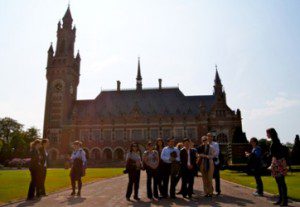This was what participants to the ‘Peacebuilding & Reconstruction’-course tried to achieve. The course focused on decentralisation as means to strengthen a fragile or (post-) conflict state. Participants came from organisations such as GIZ, USAID and UN World Food Programme, working in countries varying from Ecuador to Kosovo and Afghanistan to Burma. This diversity led to an interesting exchange of perspectives and lively discussions.
The participants were introduced to issues and challenges in peacebuilding, including: understanding and analysing social cohesion, decentralisation and intergovernmental relations, political economy of decentralisation, decentralisation as a means to mitigate regional conflict, deconcentration and devolution, and local level capacity building. They enjoyed the interactive nature of the course. Role-plays and a situation game helped them apply the lessons learnt to their daily work situations.
The general feeling at the end of the course was that the way leading to peacebuilding is not an easy and fast one. The course provided several tools to tackle the problems the participants experienced back home. The participants gained the believe that they need to take small steps in order to develop peace.
From 28 November to 9 december 2011 we will organise a two-week training course on peacebuilding in Barcelona, Spain. Click here for more information.

